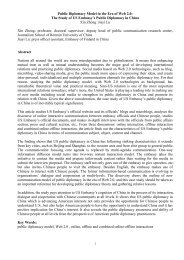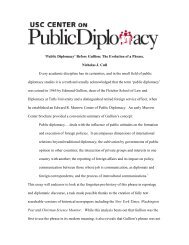Buddhist Diplomacy: History And Status Quo. - USC Center on ...
Buddhist Diplomacy: History And Status Quo. - USC Center on ...
Buddhist Diplomacy: History And Status Quo. - USC Center on ...
- No tags were found...
Create successful ePaper yourself
Turn your PDF publications into a flip-book with our unique Google optimized e-Paper software.
42 BUDDHIST DIPLOMACY: HISTORY AND STATUS QUOThis being said, a number of factors may hinder the c<strong>on</strong>structiverole of Buddhism in global affairs. First, although in most countrieschurch and state are separated, the latter seems to always havean urge to employ the faith for its political purpose. This is veryclear in China and India’s cases, where the faith is c<strong>on</strong>sidered tobe a tool to project their “soft power”. As history has shown, this isnot always beneficial to Buddhism. Sec<strong>on</strong>d, although all <str<strong>on</strong>g>Buddhist</str<strong>on</strong>g>sects regard the Buddha as the ultimate root of their faith, in reality,Buddhism is not a <strong>on</strong>e-god religi<strong>on</strong> like Christianity and Buddha isnot worshipped as a god. As a result, there are numerous <str<strong>on</strong>g>Buddhist</str<strong>on</strong>g>sects, many of which use different texts and practice and worshipvery different things, and often there is little communicati<strong>on</strong>between the sects. This inevitably results in inc<strong>on</strong>sistent messagesand can cause c<strong>on</strong>fusi<strong>on</strong> am<strong>on</strong>g the world audience, in particular inregi<strong>on</strong>s that are newly exposed to Buddhism. Third, the managementof different <str<strong>on</strong>g>Buddhist</str<strong>on</strong>g> sects represents very different power relati<strong>on</strong>swithin the sects. In some there are Western-style committees, but inothers the masters, teachers, and founding members have the finalsay. 184 This could become problematic because a number of scandalssurrounding Buddhism in the West have to do with the temples’unique management styles. 185 Last but not least, English has becomea global language and <str<strong>on</strong>g>Buddhist</str<strong>on</strong>g>s have to master the language toimprove their communicati<strong>on</strong>. Many <str<strong>on</strong>g>Buddhist</str<strong>on</strong>g> temples have facedlanguage problems in engaging in internati<strong>on</strong>al communicati<strong>on</strong>.As the world’s <strong>on</strong>ly superpower, the United States has been thetop destinati<strong>on</strong> of <str<strong>on</strong>g>Buddhist</str<strong>on</strong>g> immigrants. Although the predominantreligi<strong>on</strong> in the United States is Christianity, ir<strong>on</strong>ically it may bethe <strong>on</strong>ly country in the world where all sects of Buddhism couldbe found. In the past decades, many eminent <str<strong>on</strong>g>Buddhist</str<strong>on</strong>g> m<strong>on</strong>ks haveimmigrated to the United States, founded temples and taught Dharma.Top universities in the United States, such as Harvard University, theUniversity of Chicago, Yale University, and Columbia University,have hosted the best academic programs and prominent scholars <strong>on</strong><str<strong>on</strong>g>Buddhist</str<strong>on</strong>g> research. In this sense, the United States boasts very rich<str<strong>on</strong>g>Buddhist</str<strong>on</strong>g> resources. Some even argued that an indigenous Americanform of the Dharma, or “American Buddhism”, will emerge. 186 With











